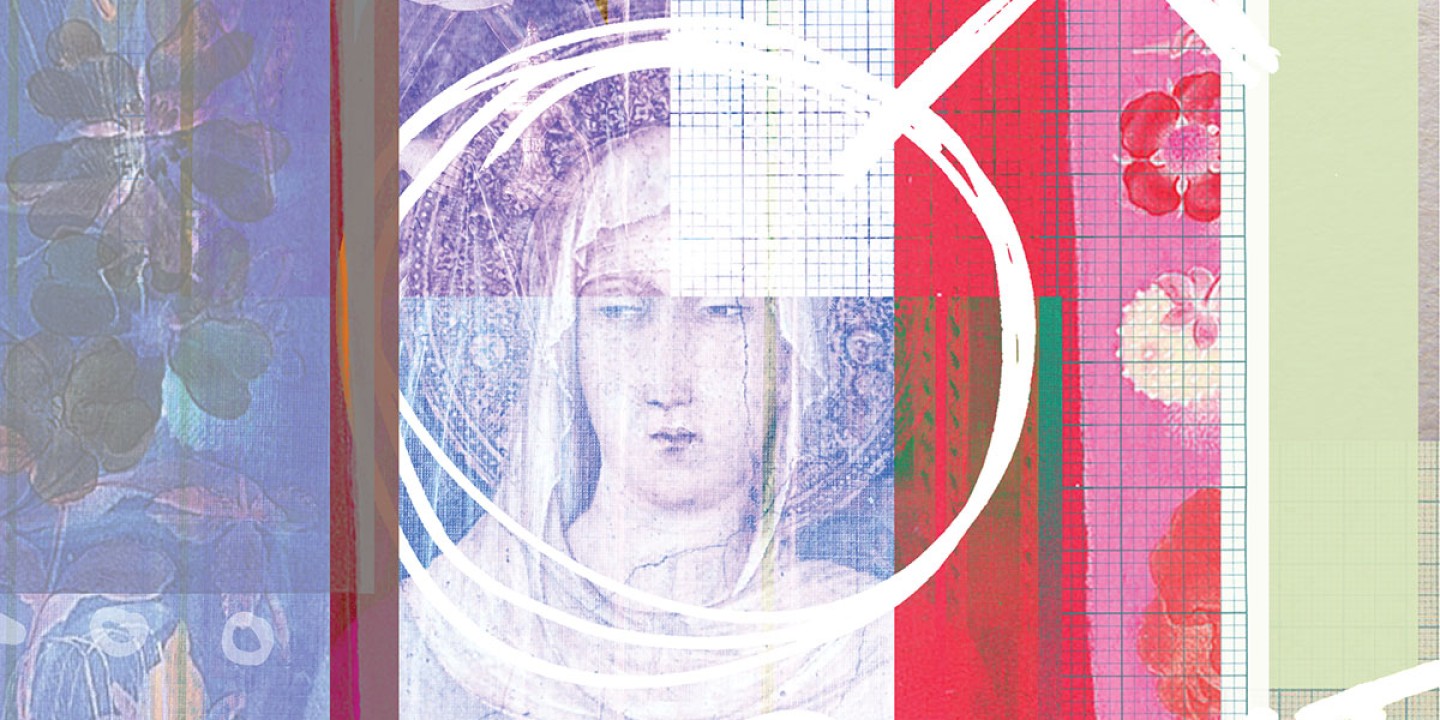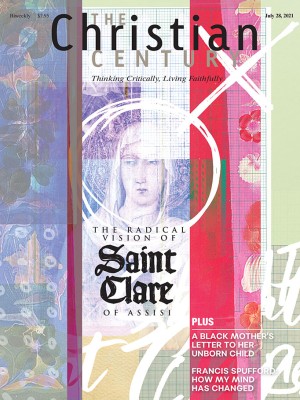On her deathbed, St. Clare of Assisi blessed God
Her radical final words confounded me for years.

“You, Lord, are blessed for having made me.” St. Clare of Assisi spoke these curious final words. After exploring Clare’s unusual spiritual vision for many years, these words continued to confound me. The boldness of this medieval saint suggesting that God blessed himself by having made her, along with the audacity of actually saying so, seemed both extraordinary and beyond the pale. Add to that the seemingly contradictory fact that St. Clare, in the sequence of her days, suffered one loss upon the next as the terms of her life were turned upside down more than once. Yet, at the end of it all, she proclaimed that God had blessed himself by her existence, strained and sorrowful though it was.
My spiritual landscape, as a Protestant, was recalibrated under the watchful care of the saints, and of Clare in particular. This came about through a sad part of my story. My marriage ended after 24 years, and one of the most traumatic aspects of this for me was the role of the church where my husband served as pastor. When I needed the church’s help and asked for it, they did not respond. The end result was that they kept their pastor and I lost my marriage. For a long time after that I left the church, at least in my heart. I thought it was fake. Having been married to a pastor for a very long time, I understood the nuances—and the occasional duplicity—that attends church ministry, and I felt I was justified in drawing that conclusion.
Read our latest issue or browse back issues.
In the aftermath of this trauma, I went on a walking tour in Italy. As I wandered through the town of Assisi, I began to be inexplicably drawn to St. Francis and desired to learn more of him. He told his followers, “We have been called to heal wounds, to unite what has fallen apart, and to bring home those who have lost their way.” This sentiment captured the mysterious draw I experienced in Assisi. St. Francis—in his Franciscan way—found me at a time when the apparatus of my own faith tradition had collapsed. He usurped my despair, rerouting my faith journey in a way that landed me in the stark, bewildering, sometimes forbidding landscape of the saints who, through their ministrations, have given me a reason to keep living and to keep believing. Clare, who was Francis’s lifelong companion, lent a particularly meaningful element to this struggle.
In the course of research for my book about St. Francis, I spoke with a Franciscan friar who said, “You cannot dream of Francis without Clare, and you cannot dream of Clare without Francis.” At the time my work focused on Francis, and the person of Clare felt elusive to me. I could not grasp her writings that spoke of such things as spiritual matrimony and beatific poverty. As a result, there always came a point in my research beyond which Clare seemed inaccessible, and I abandoned hope of really understanding her. Yet ten years hence—at a different stage of my own life and vocation—my thoughts returned to Clare. I revisited her life and writings.
My curiosity was spurred by her bewildering dying words. I felt hounded to explore her story until I could understand what she meant.
Clare (1194–1253) was the eldest daughter of a family of high nobility in Assisi, and she was also the town beauty. As such, she was being groomed by her father for a marriage of rank, and numerous suitors sought her hand. She could have had her pick of them. Instead she rebuffed them all and abandoned her life of privilege to follow Francis, who himself had renounced his rank and family. Together they vowed to live out their lives in penitence and poverty according to the mandate given by Jesus when he said, “If you want to be perfect, go, sell your possessions and give to the poor, and you will have treasure in heaven” (Matt. 19:21).
Clare’s flight from her family home was a high-spirited gesture, and she embraced it devotedly. By worldly standards, she made an unreasonable choice to give up power and station to land instead in the insecure territory of living as Jesus did.
Her intentions were wild and brave, and she pictured herself active: ministering to neighbors, serving lepers, tending her garden, offering prayers for the sick. She also imagined the sort of mendicant life that defined the male members of Francis’s order—traveling around with the message of the blessedness of gospel poverty and, if need be, being martyred for that message. She was free—unconstrained by social obligations and detached from political schemes. Granted, she was poor, but that only brought her into closer intimacy with the Lord, whose example she longed to emulate.
Yet life’s brutal realities upended her dreams of high-spirited action. By the time Clare was 32, Francis had died a lingering and tortured death due to multiple illnesses, while she herself had contracted a malady that left her unable to walk. From that time until her death, she was confined to her bed and animated her duties and longings from within the walls of her small dormitory. Even so, she changed the landscape of her world and forged an alternative picture of female empowerment that, in an upside-down way, rendered a kind of power sufficient to shut the mouths of popes and turn advancing armies on their heels.
From where did such power arise? More to the point, what was the nature of such power given Clare’s limiting circumstances? The answer comes through a series of letters Clare wrote to Agnes of Prague, a young woman of royal descent who similarly had given up a life of privilege to live out Franciscan poverty. From these letters, themes emerge that defined Clare’s spiritual vision and kept her hopeful and empowered even as her own life took unexpected turns.
Clare affirms Agnes’s vow of poverty, her choice to leave behind a world of defined roles and political wrangling in exchange for freedom and, more importantly, utter dependence upon the faithfulness of God to provide for every need. She salutes Agnes’s choice to give up her regal crown in exchange for such a life, leaving the would-be queen free to live boldly and fearlessly, which (Clare asserts) is where true power lies. “One clothed cannot fight another naked, because she who has something to be caught hold of is more quickly thrown to the ground.” Clare calls this the “glorious exchange,” swapping worldly station for the fleetness and liberation of a higher allegiance.
Beyond this, Clare exhorts Agnes to remember her calling—Franciscan poverty—and not to waver from it. She is to live her life of service and to execute it actively, consistently, unswervingly, and with a light step. Her choice of metaphor is ironic, given Clare’s own physical constraints. But what she means here is that in all of Agnes’s undertakings, as she establishes a mission for Franciscan women in Prague, she is to assert her program with gentility, humility, and deference, even as she combats forces—in this case, the pope himself—trying to pull her off course. Clare exhorts Agnes to remain hopeful and to dismiss anything that would distract her: “May you go forward securely, joyfully, and swiftly, on the path of prudent happiness, believing nothing, agreeing with nothing that would dissuade you from this commitment or would place a stumbling block for you on the way.”
Perhaps the most telling glimpse into the spiritual vision that informed Clare’s final words comes in the third letter to Agnes. She writes, “Place your mind before the mirror of eternity! Place your soul in the brilliance of glory!” Clare exhorts Agnes to picture her life (as she herself did) as if through a mirror in which the image looking back does not resemble the one gazing into it. Clare’s earthly visage was drawn and pale, but in the mirror she beheld a face of glory and beauty as an adorned and beloved bride of Christ himself. The exercise held transformative power for both Agnes and Clare (and countless other female penitents). As Clare reminds Agnes, “the King himself will take you into the heavenly bridal chamber.”
Clare’s spiritual vision culminated in its grand and final assertion, uttered on her deathbed on August 11, 1253. She first whispered to herself, “Go securely and in peace, my blessed soul.” Then she concluded, “And you, Lord, are blessed because You have created me.”
Not many of us reach the place in our spiritual journeys where our testimony is about the singular glory that God imparted to himself by creating us. Not many understand that our true mission is to give back to God this unique glory and to bless him by it.
I’ve heard testimonies that involve a picture of divine actions moving earthward from heaven, coming down, and landing in a way that brings new hope in the landscape of human sorrow. Clare’s spiritual vision, at its pinnacle, went in the opposite direction. Her testimony arose from earth to reach heaven until she saw herself as she was meant to be seen, taking her singular place in God’s saving activity. “Glorify yourself” is the prayer Jesus prays on the last night of his life. Imagine a human being so emptied of self-consciousness and filled with beatitude that one’s prayer is to see one’s life as God sees it. Then imagine giving thanks for the gift of rendering back to God a life that blesses him.
Clare, of all possible messengers, carried it to perfection. She embodied Christian truth—not dogmatic truth but mystical truth, poetical truth—as one who inch by inch was stripped of self-importance and earthly contrivances until there was nothing left except the skin and bone of her life lived out on an uncomfortable bed. That was it. That was the place of perfection, where God’s light found its fullest effulgence.
I am a flower farmer. Interestingly, that vocation has also enabled me to better grasp Clare’s final words. When you put a seed in the soil, if the basic necessities for growth are present (water, light, nutrients), the life inside the seed will do its appropriate work and it will sprout. Then, assuming that the needed elements are operative, the growing plant will continue to do what it was created to do: sprout more shoots. The shoots then—with the work of time—will come into full bloom. The seed that was sown and subjected to the operation of time and other necessary elements will inevitably bloom into full flower. It will become what it was destined to become and will be fully, wholly a flower.
The natural growth cycle of the flower can be thwarted, of course, by disease, drought, a predator, or some unforeseeable horticultural catastrophe. Otherwise, assuming all laws of nature abide in their normal courses, the seed will become a flower, and the flower will be upright, beautiful, perfect, and irreplaceable.
It could be said that Clare’s life—with its twists, losses, and struggles—was the planted seed that, with the movement of time and the workings of Spirit, became what was its destiny, a flower in bloom. And at the end of her life’s journey, God crowned her days with a picture of who he had made her to be, a perfect flower.
A version of this article appears in the print edition under the title “An empty and full life.”






